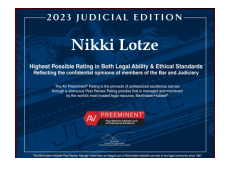At Lotze Mosley, LLP, our criminal defense attorneys in Washington D.C. and Maryland know that criminal convictions carry serious consequences, including jail time.
Depending on the severity of the charges, and the individual’s criminal history, he or she may avoid incarceration if the judge determines probation is a proper alternative.
Probation is just one piece of the offender’s initial sentence, which typically comes with specific parameters and responsibilities that must be fulfilled by the offender. Any type of probation violation could result in a judge taking a second look at the criminal case and possibly executing the suspended sentence and sending the individual to prison.
What are the Most Common Types of Probation Parameters & Responsibilities?
Common probation parameters and responsibilities will vary based on each person’s case.
However, some of the most probation terms may include, when applicable:
- Abstaining from alcohol or other substances.
- Adhering to a payment plan for embezzled funds.
- Attending addiction, mental health, or anger management counseling.
- Attending mandatory meetings with a probation officer, including in-person visits.
- Complying with family obligations, including supporting dependents.
- Geographic restrictions.
- Payment of fines and reimbursement for incarceration costs.
- Refraining from owning/possessing a firearm.
- Remaining employed or pursuing academic studies/technical training.
- Remaining in the court’s jurisdiction.
- Restitution or reparation to victims of the criminal activity.
- Undergoing treatment or rehabilitation.
Probation is typically ordered for a set length of time, which could be months or years, based on the charges, and the judge’s discretion.
How is Parole Different From Probation?
Probation requirements are enacted during the sentencing phase of a criminal case. Parole comes much later.
Parole is granted by a parole board, after the offender has served some, or most of the prison time they were originally sentenced. The parole board may consider factors such as the offender’s behavior in prison and level of rehabilitation and let him or her out early.
The parole board can also specify restrictions on the person’s activities while on parole, and when granted involves a set supervised release period. The slightest violation can result in catastrophic consequences, including the individual’s return to prison.
Contact Our Criminal Defense Attorneys at Lotze Mosley Today for Help
If you believe you have violated the terms of your probation or parole, contact our experienced criminal defense attorneys in Washington D.C. and Maryland at Lotze Mosley, LLP to get ahead of the charges, and ensure your rights are protected going forward by calling 202-393-0535 today.













